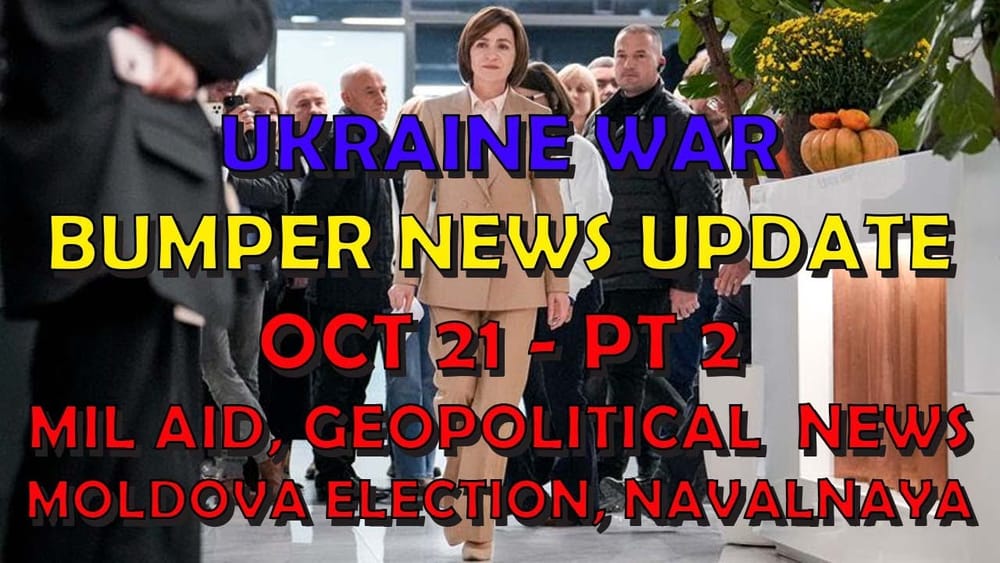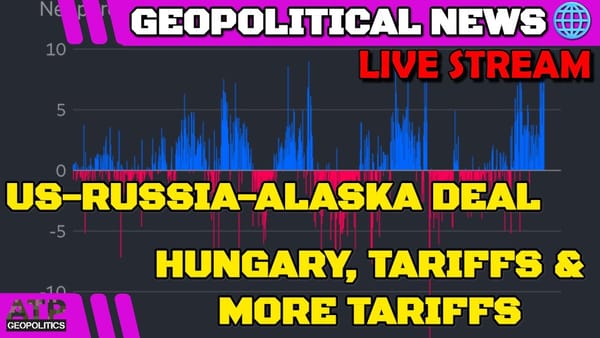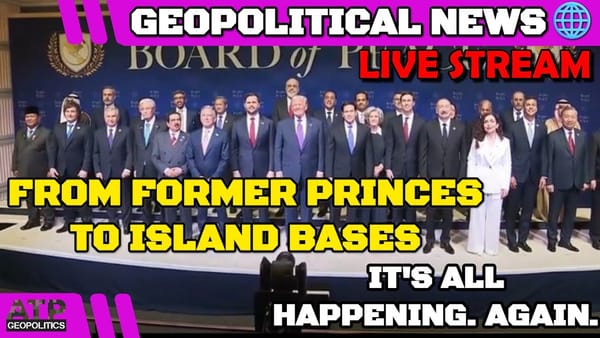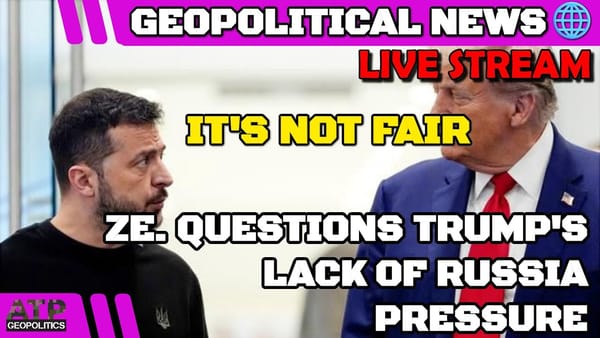Ukraine War Update BUMPER NEWS: Military Aid & Geopolitical News; Moldova, Navalnaya
🤖
This summary has been produced automatically by an AI Large Language Model (LLM) without any human intervention. Whilst every effort has been made to prompt the LLM to produce accurate output, there may be inconsistencies, inaccuracies or hallucinations!
Table of Contents 📖
"Make no mistake, Putin won't stop in Ukraine. He's just buying more time."
Hello Team
🎦 00:00-00:17⏩
- Jonathan welcomes viewers to another ATP Geopolitics video, a Ukraine War News Update (second part for 21st October 2024).
- He mentions having a slight issue starting the video but hopes to speak coherently.
- Not much military aid news over the weekend.
Potential changes to US policy on Ukraine and NATO if Harris wins the election
🎦 00:17-01:38⏩
- Report from Le Monde claims the US might lift its veto on Ukraine's NATO invitation if Kamala Harris wins the upcoming election.
- Jonathan mentions previously discussing the US warming to the idea of Ukraine joining NATO, potentially with Biden leading the effort if Harris wins.
- Restrictions on missiles could also be lifted.
- Harris's National Security Advisor may be Philip Gordon, possibly more hawkish than Jake Sullivan.
- Jonathan speculates that Harris will need to differentiate herself from Biden's approach, either by moving towards Trump's policies or by increasing support for Ukraine.
- Increased support could involve sending more equipment, lifting restrictions, and facilitating NATO membership.
Ukraine's development of the Sting drone interceptor
🎦 01:39-02:27⏩
- Ukraine is developing the "Sting" drone interceptor, capable of speeds over 160 km/h and altitudes up to 3 km (or possibly 10,000 meters, conflicting reports).
- Controlled via VR glasses, with plans to integrate AI for automatic targeting.
- Sting's cost is estimated to be 10 times less than the Shahed-136 drones it aims to counter.
- Jonathan highlights the ongoing arms race, particularly in drone technology, with a cycle of measures and countermeasures.
The ongoing arms race in drone technology
🎦 02:28-04:29⏩
- Jonathan analyses the arms race dynamic using the Shahed drones and reconnaissance drones as examples.
- Ukraine's response to Shahed drones: audio listening posts for spatial location, radar networks, mobile air defence units (from machine guns to Patriot systems).
- Russia's countermeasures: painting Shahed drones black, increasing flight altitude and speed, deploying dud drones, using reconnaissance drones for mapping.
- Ukraine's further response: developing drones to counter Shahed drones (like FPV drones used against Orlan, Supercam, and Zala reconnaissance drones), potentially using AI.
- Russia's potential future developments: AI for Shahed drones, countering electronic warfare.
- Ukraine is also using electronic warfare to spoof and take down drones.
General Cavoli's assessment of the Russian military post-war
🎦 04:30-07:48⏩
- Anton Gerashchenko reports that General Christopher Cavoli, Commander of the United States European Command, believes the Russian army could emerge stronger after the war.
- Cavoli, in an interview with Der Spiegel, cautions against underestimating Russia's military strength.
- Russia has suffered heavy losses but is learning, improving, and applying its wartime experience.
- Jonathan acknowledges Russia's adaptation and improvements despite their use of "meat wave" attacks.
- Cavoli predicts a stronger Russian army post-war, though Jonathan questions the definition of "stronger".
- Russia's best soldiers have been attrited (e.g., 155th Naval Infantry Brigade reconstituted nine times).
- Deep storage equipment has been exhausted, and production capacities are not meeting losses.
- Jonathan believes it will take a long time for Russia to mount a similar war.
- However, Russia will have gained experience, particularly in electronic warfare and drone technology.
- Cavoli points out that Russia's leadership still sees the West as enemies and will be unhappy with the war's outcome.
- He emphasizes the need for preparedness and armed forces capable of withstanding future threats.
Ukraine's role in the war and the West's knowledge extraction
🎦 07:52-10:48⏩
- Jonathan argues that Ukraine is effectively fighting on behalf of the West, making the conflict a proxy war (not in a pejorative sense).
- Ukraine's refusal of foreign troops and request for weapons highlights this role.
- The West's provision of weapons stems from the strategic importance of Ukraine's resistance.
- Ukraine's attrition of Russian forces benefits the West.
- NATO, the EU, the UK, Japan, South Korea, and Australia are gaining valuable knowledge from the war.
- Coalition capabilities (e.g., the drone coalition) are improving, leading to better equipment and a feedback loop for development.
- The West will have a stronger Ukraine as an ally after the war.
- The rest of the world, particularly the West, will emerge stronger, having learned from the conflict and invested in defence.
- The US, for example, is replacing equipment sent to Ukraine with better versions.
- Increased defence spending and recruitment across Europe are strengthening Western capabilities.
- Jonathan envisions a scenario where the war ends in 2027 with a heavily attrited Russia and a significantly strengthened West.
North Korea's aid to Russia and South Korea's response
🎦 10:48-12:41⏩
- Following North Korea's aid to Russia, South Korea summons the Russian ambassador.
- Reports suggest 12,000 North Korean soldiers may be on their way to Ukraine.
- Jonathan sees this as a potential own goal for Russia, as it could push South Korea, a "sleeping giant", towards more active support for Ukraine.
- South Korea's defence industry is significant (top 10 exporter), with a large stockpile of weaponry and efficient production capabilities.
- They have undercut European and American manufacturers in the past (e.g., main battle tanks).
- Formal involvement of South Korea in the allied effort could significantly impact the war.
- North Korea's entry into the war might end up costing Russia more in the long run.
Western components found in North Korean missile intercepted in Ukraine
🎦 12:41-14:10⏩
- Concerns about a North Korean KN-23 ballistic missile intercepted in Ukraine, which contained newly produced electronics from several Western firms:
- Analog Devices (US)
- XP Power (UK)
- NXP (Netherlands)
- Vargo (US)
- Timothy Milanov, former Ukrainian Minister of Economics, criticises these companies as "at best negligent and at worst complicit".
- NACO analysis indicates most microelectronic components were manufactured in the US, with others traced to Switzerland, the Netherlands, and the UK.
- The infographic lists other companies involved.
- The missile, with a specific serial number, was shot down on 7th September near Myrna and Blyky villages in Poltava Oblast.
- Jonathan questions whether these components reached North Korea through a complex supply chain or if there was direct involvement, calling for action to address the issue.
NATO's response to North Korea's involvement and South Korea's potential role
🎦 14:10-18:14⏩
- NATO Secretary General Jens Stoltenberg spoke with South Korean President Yoon Suk-yeol about NATO's partnership with Seoul, defence cooperation, and security in the Euro-Atlantic and Indo-Pacific regions.
- Stoltenberg warned that North Korea sending troops to support Russia would be a major escalation.
- Jonathan reiterates his "own goal" theory for Putin, suggesting the involvement of North Korea might be a deliberate attempt to influence the US elections by provoking a strong reaction and blaming the Biden-Harris administration.
- He suggests downplaying the North Korean situation could be a more effective response.
- NATO's behind-the-scenes meetings with South Korea signal the seriousness of the situation.
- Jonathan praises Stoltenberg's strong stance and his previous resistance to Trump.
- He believes Stoltenberg was a better choice for NATO leadership than someone like Kaja Kallas.
- Any new NATO Secretary General, like Harris potentially succeeding Biden, will need to differentiate themselves from their predecessor.
- Stoltenberg did a good job, but his successor might need to be more robust in defending NATO's objectives and Ukraine.
- Jonathan sees this as a natural human psychology to demonstrate leadership and effectiveness.
- Shashank Joshi from The Economist quotes Luke McGee, stating that Stoltenberg requested South Korea to send a delegation to NATO to share detailed information and expressed hope for stronger defence cooperation and security dialogue between South Korea, Ukraine, and NATO in the future.
- Jonathan views this as a positive development and highlights the need for a leader in Europe to drive collective action.
The need for a strong leader in Europe
🎦 18:15-21:07⏩
- Jonathan discusses the need for a strong leader in Europe, given the varying strengths and weaknesses of individual countries and their leaders.
- While acknowledging strong leaders like Kaja Kallas of Estonia, he points out that smaller countries cannot drive the entire European agenda.
- He believes that with the UK out of the EU, the responsibility falls on leaders of larger countries like France, Germany, Italy, and Spain.
- Jonathan suggests Emmanuel Macron might be the most suitable candidate, while expressing reservations about Giorgia Meloni's right-wing coalition and Olaf Scholz's leadership.
- He notes Macron's strong initial stance but observes a recent decline in his engagement.
- Jonathan proposes that Jens Stoltenberg, as a former Dutch Prime Minister with experience and respect in European politics, could potentially fulfil this leadership role in his position as NATO Secretary General.
- He believes Stoltenberg's non-divisive character and the central position of the Netherlands make him a suitable candidate.
- Jonathan wonders if Stoltenberg will gain more prominence in international politics.
Moldova's elections and referendum on EU accession
🎦 21:07-26:32⏩
- Moldova held elections and a referendum on EU accession, facing significant Russian interference through disinformation campaigns.
- Jonathan believes Russia aimed to derail the referendum, recognizing Maia Sandu's likely victory in the presidential election.
- He compares the situation to US elections, noting the rural-urban divide in voting patterns (rural areas skewing conservative/Republican, urban areas skewing liberal/Democrat).
- This divide also exists in the UK and across the US.
- Jonathan suggests a similar pattern in Moldova, with smaller, rural districts initially skewing against EU accession, while urban areas, counted later, supported it.
- This pattern can lead to accusations of cheating, but it's simply how vote counting works.
- With 98.56% of votes processed, the "yes" vote for EU accession won by a tiny margin (less than 1,000 votes).
- Moldova's Central Electoral Commission released preliminary results, showing 50.38% for "yes" and 49.62% for "no" on EU accession.
- Michael Weiss highlights the impressive victory despite Russian interference.
- Politico reports on Moldova's narrow "yes" vote, defying Russia.
- At one point, with 90% of votes counted, "yes" was lagging by almost 10 points, which could fuel suspicions of manipulation.
- Jonathan explains this by the later counting of votes from urban areas and absentee ballots from Moldovans living abroad, who are more likely to be pro-EU.
- In the presidential election, Maia Sandu received 42.3%, Alexander Stoyanov (pro-Russian candidate) 26.1%, and another candidate 13.8%.
- Jonathan predicts Sandu will likely win the second round against Stoyanov.
Russia's reaction to Moldova's election and EU accession referendum
🎦 26:32-29:32⏩
- The Kremlin demanded that Maia Sandu provide evidence of the election's legality, claiming foreign interference.
- Dmitry Peskov, the Russian President's press secretary, called for evidence of foreign interference.
- Dmitry from WarTranslated criticizes Peskov, urging him to respect Moldova's sovereignty.
- Renew Europe, a centrist group in the European Parliament, expresses concern about reports of election interference and vote rigging.
- They condemn Russia's hybrid war against democracies and stand with the Moldovan people's desire for a European future.
- Maia Sandu claims 300,000 votes were bought, alleging unprecedented fraud.
- She will face the pro-Russian candidate, Alexander Stoyanov, in a runoff.
- The GRU, Russia's military intelligence, is reported to have hacked Georgia's Central Election Commission, gaining access to email accounts and media organisations' IT systems.
- They also accessed Georgia's National Railway Company's systems for over two years.
- Jonathan highlights the extent of Russian involvement in these events.
Carol Cadwalladr's thread on the "Great Information War"
🎦 29:36-34:50⏩
- Jonathan discusses a thread by Carol Cadwalladr (journalist and disinformation expert) on the "Great Information War".
- Cadwalladr argues that we are already eight years into the first great information war, which began in 2014, with the invasion of Ukraine as the latest front.
- The idea that the West is not involved is a lie; the information war is part of the larger conflict.
- Putin's anger at the removal of President Yanukovych in 2014 triggered the information operations, which were crucial in the invasion of Crimea and Donbas.
- The Soviets have practiced disinformation for years, but the transformative element in 2014 was the use of social media technology.
- This represented a powerful form of hybrid warfare, manipulating hearts and minds almost invisibly.
- Russia also launched an information offensive against the West, specifically America, in 2014.
- The FBI's multi-year investigation (Mueller report) proved beyond doubt that Russia attacked the 2016 US election through multiple routes, including via tech platforms like Facebook.
- This was a military technique pioneered in Ukraine in 2014 and refined by 2016.
- Russia wasn't alone; companies like Cambridge Analytica, political operatives like Manifold, and individuals like Dominic Cummings also exploited the openness of these platforms.
- The Mueller report proves Russia's involvement, and Ukraine is at the center of it all.
- Jonathan recommends reading Professor Tamsin Shaw's thread on Aaron Banks's business partner and the Russian spy.
- In 2016, this information was unknown, and Russia acted with impunity.
- Academics, journalists, and the FBI have since exposed this complex and messy situation.
- The West failed to acknowledge Russia's military attack, downplaying it as "meddling" or "interference".
- Cadwalladr emphasizes that it was warfare.
The failure to recognise the information war and its consequences
🎦 34:50-37:02⏩
- Jonathan agrees with Cadwalladr, highlighting the failure to recognize the information war as central to the current situation in Ukraine.
- Putin won the first offensive (2014-2022) by convincing the West it wasn't a war.
- The West dismissed it as "just ads" that didn't work.
- Facebook remains an open threat surface, exploited by authoritarians worldwide.
- Cadwalladr asserts that the world is at war, even if it's not a world war, and describes Britain as a "captured state".
- In America, institutions worked despite Trump, with investigations, indictments, and jail sentences related to Russia's hostile actions.
- However, the US media and public failed to grasp the Mueller report's real lessons.
- The UK didn't even try, sweeping the 2016 events under the carpet (Nigel Farage, Aaron Banks, Facebook, Russia).
- It wasn't just ads; it was war.
- It's crucial to understand that Putin's attack on Ukraine and the West was a joint attack on both, starting simultaneously across the same platforms.
- The invasion of Ukraine is not just about Ukraine; the West is part of the plan.
- Ukraine is fighting for the West as well.
- The West's failure to understand Putin's strategy stems from not recognizing it's directed at them too.
- This makes the current moment uniquely perilous.
- The Skripal poisoning, planned by the GRU, is an example of military doctrine carried out by military officials, similar to the situation in Ukraine.
Georgia's upcoming elections and pro-EU demonstrations
🎦 37:02-37:50⏩
- Georgia's elections are five days away (26th October).
- Huge pro-EU demonstrations took place in Tbilisi over the weekend.
- No Report states "Georgia chooses the European Union".
- A massive opposition march is underway ahead of the elections.
- Moldova is holding the first round of presidential elections and a constitutional referendum on EU integration with 11 candidates running.
Distrust in Western support for Eastern Europe
🎦 37:50-39:10⏩
- Ivana Stradner, a Balkans expert, notes distrust in Poland towards Western powers' commitment to protecting Europe against Russia.
- Biden recently tweeted about the US's commitment to its friends (the Quad: US, UK, France, and Germany, and possibly Italy).
- Stradner reports that people in Poland and the Baltic countries feel the same way, not trusting the US, France, Germany, or the UK to protect them.
- She warns that Putin won't stop in Ukraine and is just buying time.
- Jonathan partially agrees but doubts Russia's current military capacity for a move into Europe, particularly with ground and air forces.
- He acknowledges the potential for information warfare.
- People in the Baltics and Poland are concerned about the threat of Russia and are taking matters into their own hands.
Allegations of House Republicans acting as Russian agents
🎦 39:10-40:01⏩
- Representative Daniel Goldman on CNN revealed that House Republicans, wittingly or unwittingly, have been acting as agents or assets for Russian intelligence.
- This raises concerns about the current state of the Republican Party.
- Jonathan mentions previous complaints about Russian propaganda reaching Congress, potentially through individuals like Marjorie Taylor Greene.
- There are concerns about Russian agents, intentional or not, operating within Congress.
Lloyd Austin's visit to Kyiv and UK-Germany security pact
🎦 40:01-40:31⏩
- US Defence Secretary Lloyd Austin arrived in Kyiv for a surprise visit amid questions about the long-term sustainability of Western support for Ukraine.
- Britain and Germany signed a historic security pact, allowing joint military exercises on NATO's eastern border with Russia (likely in Estonia and Lithuania).
- This follows a recent UK-Germany security pact, the specifics of which are unclear.
Britain's efforts to strengthen relationships with Europe and potential for EU re-entry
🎦 40:32-43:44⏩
- Britain has been seeking closer relationships with Europe, with Keir Starmer recognizing the impossibility of immediate EU re-entry due to the remaining Leave voters.
- Jonathan acknowledges the older skew of the Leave vote and the theory that re-entry might be more feasible once those generations have passed and younger, more pro-EU generations become dominant.
- Polls currently show a pro-EU majority in the UK.
- The Labour Party was split on Brexit, with Jeremy Corbyn being a "Lexiteer" (left-wing Brexit supporter).
- Jonathan explains the EU's nature as a neoliberal economic free market trade bloc, which might clash with Corbyn's socialist outlook.
- Critics of the EU often point to its regulations, creating an inherent contradiction between free market principles and regulatory oversight.
- Labour's stance on Brexit was ambiguous, leaving it to the electorate and individual campaigns.
- The Conservative Party was also divided on the issue.
- Keir Starmer is currently focused on building closer relationships with Europe without immediate re-entry, pursuing bilateral deals and security agreements.
- This could be a step towards eventual integration, but it's also necessary for security cooperation regardless of EU membership.
- The UK needs to work closely with allies like NATO and the EU to counter threats from BRICS, Russia, China, Iran, and North Korea.
- Jonathan supports this approach, viewing it as essential for security and potentially paving the way for future EU re-entry.
Poland's plans for stronger sanctions on Russia during its EU Council presidency
🎦 43:44-44:39⏩
- Poland will push for stronger sanctions on Russia during its presidency of the EU Council starting in 2025.
- This follows Viktor Orban's controversial presidency, which many were unhappy with.
- Poland aims to tighten controls on Russian energy imports (including fuel and LNG) with support from several EU countries.
- The focus will be on transparency in energy supplies and addressing sanctions evasion.
- Hungary may oppose future sanctions, but Ukraine is optimistic that Poland will drive decisive action to limit Russia's war capabilities.
- Jonathan welcomes the change from Orban's leadership to a more pro-Ukraine and anti-Russia agenda under Poland's presidency.
Lula's stance on Ukraine and Russia, and his absence from the BRICS summit
🎦 44:39-47:16⏩
- Jonathan discusses Lula da Silva's stance on the Ukraine war, acknowledging his preference for Lula over his predecessor, Jair Bolsonaro.
- He doesn't believe Lula is a natural supporter of Putin but recognizes Brazil's reliance on trade with Russia (fertilisers, imports, exports).
- Lula's anti-American stance positions him in an interesting but complex position.
- Jonathan suspects Lula's sometimes supportive statements towards Russia are primarily motivated by looking out for Brazil's interests.
- However, he finds Lula's lack of strong support for Ukraine annoying.
- CNN reports that Lula suffered an injury in an accident and will not attend the upcoming BRICS summit in Kazan, Russia.
- Doctors diagnosed an injury to the back of his head, advising against air travel.
- Jonathan speculates that this might be a manufactured excuse for Lula to avoid the summit.
- He believes this could be Lula's attempt to maintain a neutral stance while avoiding direct association with Russia.
- Jonathan criticizes Lula's stance on Ukraine and his promotion of the China-Brazil peace plan, but reiterates that Lula is not a strong Putin supporter either.
- He acknowledges Brazil's importance as a global player.
Yulia Navalnaya's potential presidential candidacy in Russia
🎦 47:19-49:17⏩
- Yulia Navalnaya, Alexei Navalny's widow, stated in a BBC interview that if she returns to Russia, she will run for president.
- She acknowledges that returning to Moscow is impossible as long as Putin remains in power.
- She couldn't even attend her husband's funeral due to the risk of arrest.
- A criminal case has been opened against her in Russia under charges related to participation in an extremist organisation.
- Jonathan sees this as a significant development, potentially laying the groundwork for an opposition leadership in exile.
- He considers it a "broadside" against Putin and a powerful announcement for the future.
- This could galvanize Navalny's supporters in Russia and abroad, potentially attracting Western support and forming a meaningful opposition movement.
- Jonathan had been speculating about her potential political aspirations, observing her in the Navalny documentary and wondering if she had the qualities of a politician.
Wrap Up
🎦 49:18-49:22⏩
- Jonathan concludes the video, mentioning he's been talking for too long.
- He bids farewell to his viewers.
🤖❓ AI Debrief (post task) - anything the AI didn't understand
Timestamp 01:51-01:53⏩: The transcript mentions conflicting reports about the Sting drone interceptor's altitude (3 kilometers vs. 10,000 meters). Which is more accurate/credible?
Timestamp 11:59-12:01⏩: Jonathan mentions a manufacturer of Leopard tanks (KMW) but struggles to recall the name. Could you confirm the correct name? It's likely Krauss-Maffei Wegmann (KMW).
Timestamp 29:28-29:30⏩: Who is Professor Shaw Tamsin Shaw? Some background information on her would be helpful.
Timestamp 46:56-46:58⏩: What is the "China-Brazil peace plan" that Jonathan refers to? Is there more information available on this?
🤖💭 AI Plan (pre task) - the AI's step by step thought process
Steps:
TASK 1:
Identify the title, date, and part from the Youtube video title.
Extract the title by removing the date and part information.
Reformat the date from YYYYMMDD to DD/MM/YYYY.
Extract the part letter if present.
TASK 2:
Read through the transcript, identifying distinct topics discussed.
Create concise, specific, and quantified topic titles for each topic.
Ensure the first topic is "Hello Team" and the last is "Wrap Up".
Use Ukrainian spellings for place names.
Separate topics by country, category, region, or news item for granularity.
TASK 3:
For each topic identified in TASK 2, find the start and end timestamps.
Format timestamps as MM:SS or HH:MM:SS depending on video length.
Use the format "start timestamp - end timestamp".
Separate multiple timeframes with commas.
Double-check for any gaps or missing topics.
TASK 4:
Write a detailed summary for each topic, using bullet points where appropriate.
Include context, Jonathan's opinions, insights, and analysis.
Credit sources mentioned by Jonathan.
Convey Jonathan's personality, humour, and passion.
Correct any errors in the transcript (e.g., spellings, place names).
TASK 5:
Select a significant, meaningful, thought-provoking, poignant, or hilarious quote from the transcript.
Ensure the quote is concise and makes sense out of context.
Correct any errors in the quote.
TASK 6:
List any aspects of the transcript or tasks that were unclear or required clarification.




